
Facebook COO Sheryl Sandberg's book Lean In: Women, Work, and the Will to Lead comes out Monday, but it's already spawned an entire backlash and counter-backlash. BuzzFeed talked to Sandberg about what she hopes people take from the book.
On the response to her book and being pitted against Anne-Marie Slaughter:
Look, passions run deep on these issues. These issues are deeply personal for all of us. They're deeply personal for men and women. They go to the heart of who we are, what we expect from our workplaces, what we expect from our partners, what kinds of biases we face, all of that. The passions run strong, and the fact that these issues are so important to all of us, that's not a bad thing. I think that's a good thing. What I'm most worried about and the reason I wrote Lean In is I'm worried that we've had a stagnation for women in leadership roles in the last 10 years, and I'm not sure enough people have noticed. I'm quite sure people are not focused enough on this as a huge problem that needs to be fixed, and if these debates are now getting more active and that shakes things up and gets us to focus on this problem, that's a good thing.
On what Lean In really says:
I tried to put everything in the book. I'm not saying the book is comprehensive or perfect, because it's not. But I think there are messages I have in the book that people don't hear as much as I'd like them to, and I can't tell if that's because right now a lot of people writing on it haven't read it, or if that will continue. One is that I believe there are very important institutional barriers for women. I believe women are held back by sexism, by discrimination, by lack of flexibility. I believe public policy changes need to be made. I believe all of that very strongly.
On why she focused on what women can do to help themselves:
My book focuses more on what I see as the internalization of sexism, the things we can do ourselves, but not because I don't think the other stuff is just as important. It's more because for my whole career I heard about the institutional barriers and the policy barriers, but I never heard about the things I could do myself. I am not saying women can do it all themselves. I've never said that, and I have not said that in the book. I'm saying we need all of these parts. We need to fix the institutional problems, we need to fix public policy, and we have to fix our stereotyped assumptions of men and women that we hold internally and that other people hold for us. We cannot fix any of this without fixing all of this, and I'd love for that message to get out more clearly.
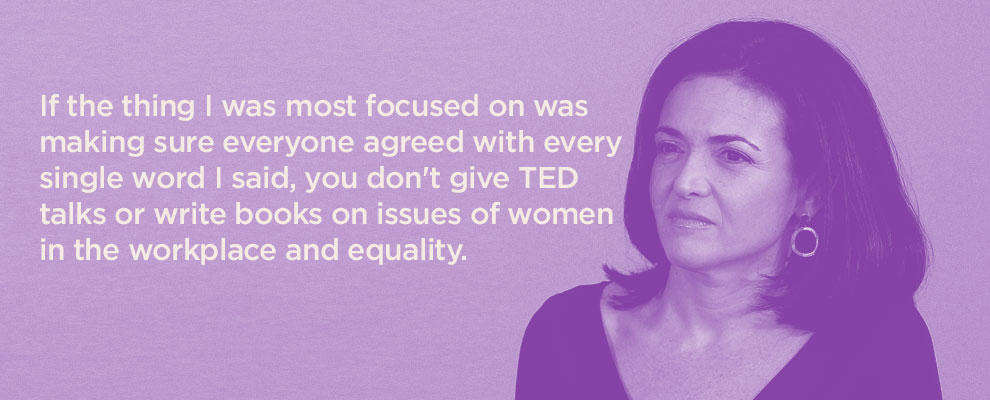
On being liked (or disliked) as a successful woman:
I'm really honest in the book that this is something I've struggled with. I tell the story in the book that six months into working with Mark at Facebook, I had my first review, and Mark said to me, "You care too much about being liked and you care too much about trying to please everyone, and you're never going to have the impact that you want to have if that's your primary concern. This is going to hold you back." If the thing I was most focused on was making sure everyone agreed with every single word I said, you don't give TED talks or write books on issues of women in the workplace and equality.
I dont pretend this is always easy for me. It's not. But I also really believe that I want a more equal world, I want that for the people I work with, I want that for my friends, my colleagues, and I want that for my kids.
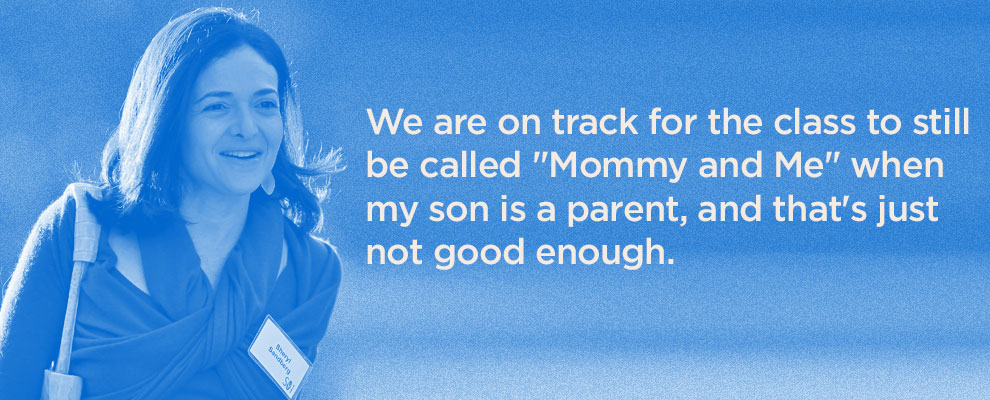
On parenting and what dads must do:
I have a 7-year-old son and a 5-year-old daughter, and I ask myself every day, Is the world going to be different for them? If my son wants to be a stay-at-home dad, I am going to cheer him on, but is the world going to accept him the way it should, or is the class still going to be called "Mommy and Me" when he's a parent? We are on track for the class to still be called "Mommy and Me" when my son is a parent, and that's just not good enough.
I'm very clear in the book, I think men need to be equal partners and equal parents. Just like we need to cheer women on for being leaders and being successful, we need to cheer men on for being nurturers and providers and good fathers and great partners, and I don't think we do enough of that. Just like it's hard for women to lead because we don't associate women with leadership characteristics, it's hard for men to nurture, because we don't associate men with nurturing characteristics. And I'm also really clear in the book that one doesn't change without the other. I feel like I have really important messages in there for men, and I really hope people focus on them as well, because they're just as important.
On how women find mentors:
A recent survey of managers said that 64% of men in managerial roles are nervous about being alone in a room with a woman. No wonder women don't get as many mentors and sponsors — mentoring and sponsoring is all about being alone in a room with someone, because you have to talk to them alone about their dreams and their career goals and their obstacles. I want us to acknowledge that men are nervous to be alone with women, and I want us to solve the problem, and we're not going to solve the problem until we talk about it, and that's really what Lean In is trying to do.
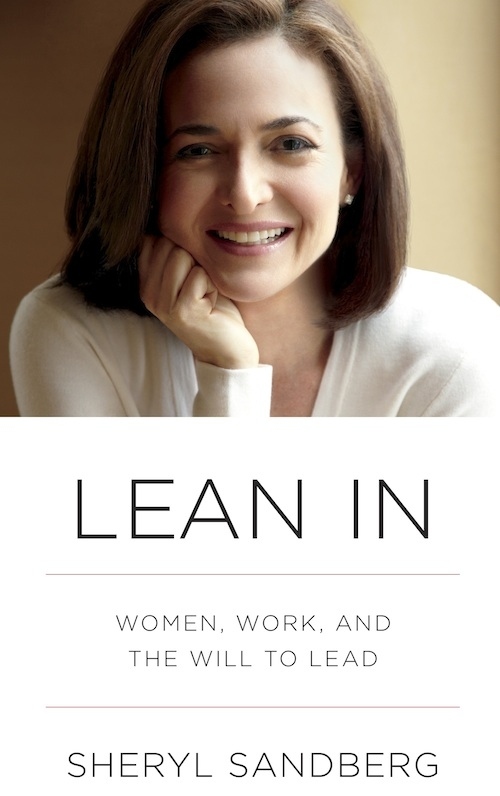
On why women don't relocate for work:
I think acknowledging that the relationship between couples and partners is so important for work decisions and for home decisions is really important. I'll share one example: A long time ago, the CEO of Coca-Cola told me that career paths at Coca-Cola had a lot to do with moving around. The way you moved up is you moved from division to division, and a lot of that was moving geographically. And what he realized was one of the things blocking women was when it was a man whose turn it was to get the next job, their partner moved with them. But when it was a woman who was trying to work to get the next big job, it was just much more difficult for their partners to move, so a lot more women turned down the job. And when he dug into why women were turning down the job, it was really that either their partner couldn't or wasn't willing to move. So one thing he did, there was a woman he wanted to make head of a big Europe job, but she couldn't move. So he let her do the job from a different country. Their headquarters were in one country and she was in an another. His point to me was he realized that he had to be more flexible with women. The only way to get her into that job was to let her telecommute from another country, and he let her do it.
One of the things I'm trying to do with the whole book and the whole process of leanin.org is I think we have really big issues around getting women into leadership roles, because women face really unique challenges. The challenge we're talking about right now is one of those challenges. Not always — there are plenty of women and men who can't move or won't move — but on average there are more women than men who are likely held back in their career progression because of their partners.
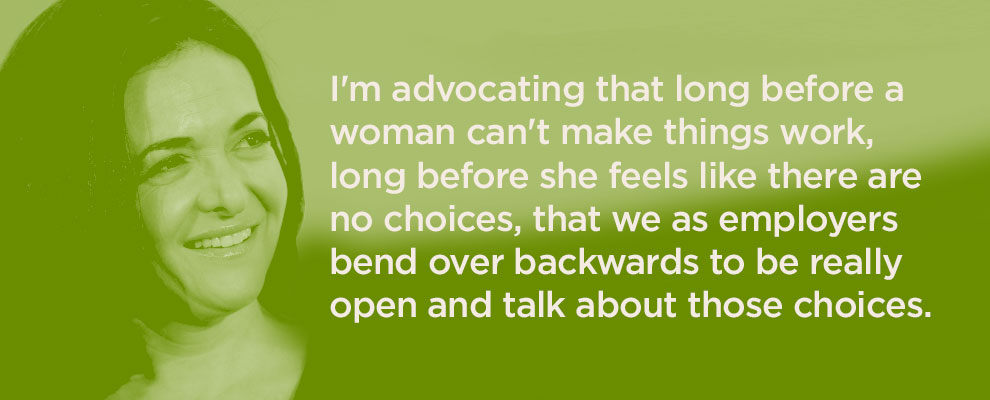
On how to talk about pregnancy before it happens:
We do not talk about gender issues in the workplace, and my view is, I don't know how we solve these problems unless we can have an open and honest conversation. And that's what Lean In is trying to do. I think we need to talk in corporations, in families, in the national conversation, but also the quiet conversations between an employee and a boss, an employee and a peer, an employee and a mentor, a husband and a wife, a partner and a partner, a parent and a child. We need to start having these conversations much more openly.
It's so easy to take this advice out of context, so I want to be clear what I'm not saying. What I'm not suggesting is that everyone should have to tell their employers when they're thinking about having children. What I'm not suggesting is that employers have the right to ask any question, and use any information as the basis of any decision. Not in a million years would I suggest any of those things. Here's what I am suggesting: What I am suggesting is if employers want to keep women in the workforce through the childbearing years, we know as employers that we lose a lot of our high-potential women in those years, and in that situation, an open invitation to talk about it in a way that gives the woman or the man the option to talk about it, I think is a great idea.
And helping women have kids and still keep their jobs:
My brother is a surgeon, and he was recruiting a woman to join his surgical team. She has a couple different job offers, and she's in her late twenties and just got engaged. He had made her an offer, and while they were talking about whether she would join, he said the following to her: "Listen, I know that you're in your late twenties and you just got engaged. You may want to have children one day. I watched my two sisters and my wife struggle with that in the workplace. They were so nervous they didn't know if they could tell their boss. They were worried their jobs were going to get taken away. You don't ever have to talk to me about this, but if you want to come and work here with me on my team and one day you want to have children, I want you to know you can talk to me about it any time. I want you to have a different experience than my sisters and wife did. Our institution is going to be firmly supportive of making this work for you on your own terms and I want you to know that." That's what I'm advocating. I'm advocating an open invitation to talk.
I've done this over and over. I will say, "I have no idea if you want to have children one day and you have no need to tell me anything ever, but if you want to talk to me about whether you might want to have children one day and what that might be like in your job at Facebook, I want you to know I am here to talk to you about it and I will help you." I'm advocating that long before a woman can't make things work, long before she feels like there are no choices, that we as employers bend over backwards to be really open and talk about those choices.
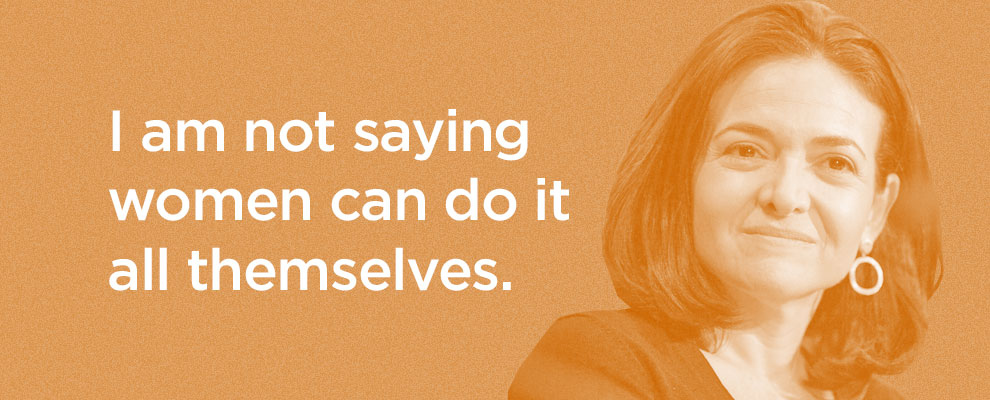
On how bosses can help men and women figure out a work life with kids:
Another story someone told me recently: A guy who was working in a tech company at the time said he had a whole bunch of women working with him, and a bunch left after having a baby or during their childbearing years. There was one woman he was personally very good friends with so she, unlike the others, talked to him much more openly. She would say, "Look, I'm having a baby next year. What are we going to do?" Because of that, he really helped her navigate through it — he helped her figure out who would take over her team while she was on maternity leave, he heard her fears that they were going to take away her job, and he was able to reassure her. He said that woman stayed and was still there, and he looked back on the other women who wound up leaving, and he had to ask himself the question, "If I had been friendly enough with those women, if they felt as open and honest having conversations with me, would the outcomes have been different?" And so what I'm advocating is that we find a way, respecting the law, not forcing anyone to tell anything, and certainly not having any conversations which enable us to discriminate on the basis of any of this, that we find a way to help women and men navigate through this. We've essentially said we're not going to talk about this, which essentially means you're on your own, figure it out. And that's not good enough.
And on how public policy is a key component:
Our country is way behind. We don't offer maternity or paternity leave. Only five states have any kind of paid maternity or paternity leave, and something like 40–50% of women don't get any paid sick days to care for themselves or a sick child. I bet you a bunch of men don't get any paid sick days either. I think we're way behind, and I definitely think we need to catch up. I also think if we had more women in positions of power, including government, then we would be much more likely to get the government and public policy protections that we want. Part of the core thesis of the book is we have a lot of really deep problems and challenges for women and men, and I think if we had equal representation at the table where decisions are made in companies, in government, in nonprofits, and in organizations of all kinds, we would get better answers. I firmly believe that.
